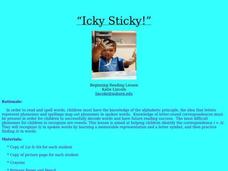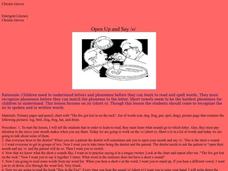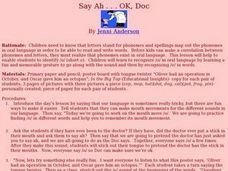Curated OER
IzzyWizzy
Young scholars complete a variety of activities related to the short /i/ sound. As a class they recite a tongue twister, then spell different words using letter manipulatives. Students then read the book "Tin Man Fix It," and identify...
Curated OER
Can you cry like a baby?
Students practice the strategies of phonemes and spellings maps to sound out new words. They work on the short vowel /a/ sound with a sentence strip with "Allie the Alligator sat on a mat eating apples," on it and the book, "Cat in the...
Curated OER
Copycat, Copycat!
Students observe that sometimes the letter "c" is a copycat letter and sometimes acts like a "k" or an "s" like in the words "cat" and "race". They use Elkonin letter boxes and letters to spell words as they are called out by the...
Curated OER
The Crying Baby
Pupils practice recognizing phonemes with letters emphasizing the /a/ in spoken words and by letter symbols. They interact with Elkonin boxes, letter manipulatives, the book, "A Cat Nap," and a poster with a tongue twister on it.
Curated OER
/o/... I can't stop yawning!
Learners investigate the phoneme, a meaningful representation, and the letter symbol for /o/ (short o). This lesson helps students recognize the /o/ in spoken words and begin to spell words with the assistance of letter boxes. Learners...
Curated OER
Can You Slither Like a Snake?
Students explore letter-sound correspondences. They explore the letter s and the sound produced by the letter. Students explore how to write both the upper and lower case forms of the letter s. Students identify s in both written and...
Curated OER
Adam's Apples
Students examine the /a/ phoneme in both written and spoken words. They practice finding the /a/ in words, watch how their mouths move when making the sound, and write the letter. Next, they differentiate the sound in words, listen to a...
Curated OER
Icky Sticky
First graders the /i/ sound by practicing the way the mouth moves while making the sound while saying "icky, sticky." They write the letter "i" using both upper and lower case letters, make words using letterboxes, and write about a...
Curated OER
Icky Sticky
Students recognize the short vowel i in written and spoken language. Through matching and listening activities, they discriminate the vowel sound /i/ from other phonemes. Students identify the phoneme and letter in words and pictures.
Curated OER
Abigail Ant
Students recognize the short vowel a in written and spoken language. Through matching and listening activities, they discriminate the vowel sound /a/ from other phonemes. Students identify the phoneme and letter in words and pictures.
Curated OER
Open Up and Say /o/
Students explore letters and phonemes. They discuss the phoneme /o/. Students recognize /o/ in both spoken and written words. They discuss the shape their mouths make when saying /o/. Students learn a tongue twister to help them identify...
Curated OER
Open Wide and Say Ahh
Students recognize the short vowel o in written and spoken language. Through matching and listening activities, they discriminate the vowel sound /o/ from other phonemes. Students identify the phoneme and letter in words and pictures.
Curated OER
Mmmm, Good!
Students complete a variety of activities related to the letter M. They trace and write the letter M, and identify words on word cards that contain the letter M. Students also participate in a Letter M Hunt in their classroom, and...
Curated OER
Say What?
Students explore phonemes in spoken words. They discuss the /e/ (short e) correspondence. Students read "Red Gets Fed." They learn a meaningful letter symbol for the /e/. Students identify /e/ sound in both spoken and written words.
Curated OER
Icky Sticky
Young scholars recognize the short vowel i in written and spoken language. Through matching and listening activities, they discriminate the vowel sound /i/ from other phonemes. Students identify the phoneme and letter in pseudo words...
Curated OER
Yummy in My Tummy
Students explore phonemes in spoken words. They discuss the correspondence u=/u/. Students identify a meaningful representation for the phoneme and practice identifying /u/ in both written and spoken words. Students learn a tongue...
Curated OER
Tricky T
Students practice the corresponding phonemes associated with the letter and sound symbol to T. They identify the letter, write it and also identify pictures that display it's beginning sound. Students also interact with the book,...
Curated OER
Say Ah . . . OK, Doc
Students distinguish between letters that stand for phonemes that deal with the short /o/ sound. They study how spellings map out the phonemes in oral language in order to be able to read and write words. Each student practices the...
Curated OER
The Beautiful Bouncing Ball
Students practice recognizing a letter and its phoneme by utilizing the alphabetic principle while working with and identifying the sounds of /b/. They assess a big book, objects in the room, a timer and the tongue twister, "Billy...
Curated OER
Fun with Fish!
Students observe the phoneme and digraph /sh/ in spoken words. They discover a meaningful representation and practicie finding /sh/ in words. They read and spell words (using a letterbox lesson) that contain the phoneme /sh/.
Curated OER
Droopy Dog says....
Students study the /d/ sound by making the sound and determining where their tongue is when the make it. They repeat a tongue twister while emphasizing the /d/ sounds. Next, they identify the sound in words as the teacher uses a puppet...
Curated OER
Baby Sally is Upset Again!
Learners, assessing how to read and write, join together grapheme's and the phonemes that make up words. They practice recognizing in oral and written form the vowel /a/. The book, "Matt and Rags," is introduced to the students in this...
Curated OER
Iiizzy is Iiicky Sticky!
Students answer a series of questions about the different sounds that the letter I makes. They observe a picture about a girl and the letter I. They practice a tongue twister with the different sounds of I. They practice writing the...
Curated OER
U-u-under The U-u-umbrella!
Students practice using phonemes because they need to be able to recognize that phonemes and letters correspond with each other in order to become a proficient reader. The practice is done using the letter "u".

























